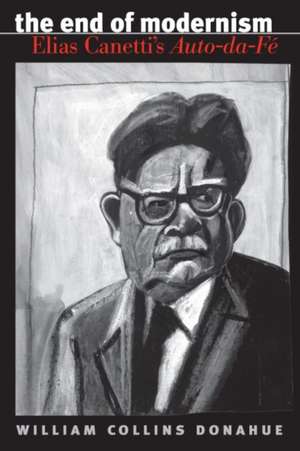The End of Modernism: University of North Carolina Studies in Germanic Languages and Literature
Autor William Collins Donahueen Limba Engleză Paperback – mai 2020
Din seria University of North Carolina Studies in Germanic Languages and Literature
-
 Preț: 187.31 lei
Preț: 187.31 lei -
 Preț: 168.04 lei
Preț: 168.04 lei -
 Preț: 167.28 lei
Preț: 167.28 lei -
 Preț: 187.85 lei
Preț: 187.85 lei -
 Preț: 186.70 lei
Preț: 186.70 lei -
 Preț: 190.56 lei
Preț: 190.56 lei -
 Preț: 169.77 lei
Preț: 169.77 lei -
 Preț: 223.88 lei
Preț: 223.88 lei -
 Preț: 188.23 lei
Preț: 188.23 lei -
 Preț: 185.56 lei
Preț: 185.56 lei -
 Preț: 150.90 lei
Preț: 150.90 lei -
 Preț: 189.42 lei
Preț: 189.42 lei -
 Preț: 151.87 lei
Preț: 151.87 lei -
 Preț: 167.06 lei
Preț: 167.06 lei -
 Preț: 171.90 lei
Preț: 171.90 lei -
 Preț: 168.42 lei
Preț: 168.42 lei -
 Preț: 167.86 lei
Preț: 167.86 lei -
 Preț: 169.95 lei
Preț: 169.95 lei -
 Preț: 170.37 lei
Preț: 170.37 lei -
 Preț: 171.13 lei
Preț: 171.13 lei -
 Preț: 210.22 lei
Preț: 210.22 lei -
 Preț: 168.81 lei
Preț: 168.81 lei -
 Preț: 227.70 lei
Preț: 227.70 lei -
 Preț: 166.90 lei
Preț: 166.90 lei -
 Preț: 168.04 lei
Preț: 168.04 lei -
 Preț: 186.32 lei
Preț: 186.32 lei -
 Preț: 170.92 lei
Preț: 170.92 lei -
 Preț: 168.24 lei
Preț: 168.24 lei -
 Preț: 168.81 lei
Preț: 168.81 lei -
 Preț: 185.35 lei
Preț: 185.35 lei -
 Preț: 209.79 lei
Preț: 209.79 lei
Preț: 205.00 lei
Nou
Puncte Express: 308
Preț estimativ în valută:
39.23€ • 40.81$ • 32.39£
39.23€ • 40.81$ • 32.39£
Carte tipărită la comandă
Livrare economică 14-28 aprilie
Preluare comenzi: 021 569.72.76
Specificații
ISBN-13: 9781469657424
ISBN-10: 1469657422
Pagini: 304
Dimensiuni: 152 x 229 x 18 mm
Greutate: 0.45 kg
Editura: The University of North Carolina Press
Seria University of North Carolina Studies in Germanic Languages and Literature
ISBN-10: 1469657422
Pagini: 304
Dimensiuni: 152 x 229 x 18 mm
Greutate: 0.45 kg
Editura: The University of North Carolina Press
Seria University of North Carolina Studies in Germanic Languages and Literature
Notă biografică
William Collins Donahue is the Cavanaugh Professor of the Humanities and the Director of the Initiative for Global Europe in the Keough School of Global Affairs at the University of Notre Dame. His is author or editor of many books including Holocaust as Fiction: Bernhard Schlink's 'Nazi' Novels and their Films and Die große Mischkalkulation: Institutions, Social Import, and Market Forces in the German Literary Field.
Descriere
Nobel laureate Elias Canetti wrote his novel Auto-da-Fe when he and the twentieth century were still quite young. The End of Modernism places this work in its cultural and philosophical contexts, situating the novel not only in relation to Canetti's considerable body of social thought, but also within larger debates.
